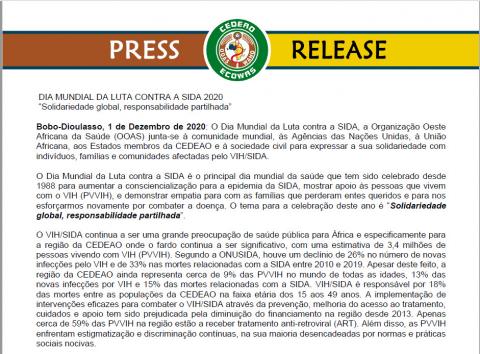
WORLD AIDS DAY 2020
“Global solidarity, shared responsibility”.
Bobo-Dioulasso, 1 December 2020: The World AIDS Day, the West African Health Organization (WAHO) joins the global community, UN Agencies, the African Union, ECOWAS Member States and the civil society to express its solidarity with individuals, households and communities affected by HIV/AIDS.
The World AIDS Day is the premier global health day that has been celebrated since 1988 to raise awareness to the AIDS epidemic, show support to people living with HIV (PHLIV), and empathize with families who have lost loved ones and to rededicate ourselves to tackling the disease. The theme for this year’s celebration is “Global solidarity, shared responsibility”.
HIV/AIDS still remains a major public health concern for Africa and specifically for the ECOWAS region where the burden remains significant with an estimated 3.4 million persons living with HIV (PLHIV). According to UNAIDS, there was a decline in number of new HIV infections by 26% and AIDS-related deaths by 33% between 2010 and 2019. Despite this achievement, the ECOWAS region still accounts for about 9% of the world’s PLHIVs of all ages, 13% of new HIV infections and 15% of AIDS-related deaths. HIV/AIDS is responsible for 18% of the deaths among the ECOWAS population aged 15-49 years. The implementation of effective interventions to tackle HIV/AIDS through prevention, improved access to treatment, care and support has been undermined by the dwindling funding in the region since 2013. Only about 59% of PLHIV in the region are on antiretroviral treatment (ART). In addition, PLHIVs face continuing stigmatization and discrimination mostly triggered by harmful social norms and practices.
Ending the HIV/AIDS epidemic is a shared responsibility which requires global solidarity and strategic partnerships. As part of its contributions toward addressing issues of HIV/AIDS in the region, WAHO coordinated the adoption of the resolution on the ECOWAS Key Population Strategy by the Assembly of Health Ministers in August 2020. The strategy builds on the Dakar Declaration of April 2015 and acknowledges the reduced access of key population groups to HIV programmes in the ECOWAS region due, in part, to the criminalization of their sexual practices of key population, as well as the pervasive stigma and discrimination. It articulates interventions to improve their involvement in health policy decisions that concern them as well as their access to prevention and care services in the area of HIV/STI/TB/Hepatitis B & C as well as sexual and reproductive health and rights.
Furthermore, the on-going COVID-19 pandemic has come with its own challenges such as the disruption of essential health services which has led to breaks in supply chain for essential medicines and vaccines, delayed diagnosis, continuity of treatment particularly for vulnerable populations, increased cases of gender-based violence, discrimination and stigma and economic hardship. This, therefore, highlights the importance of addressing both the clinical and social dimensions of HIV/AIDS in the ECOWAS region.
WAHO has provided technical and financial support to HIV programmes of Member States, established a regional buffer stock of antiretroviral drugs and provided a forum for regular exchange of best practices on HIV policy and practice, programme management, as well as in monitoring and evaluation. WAHO will continue to work in partnership with stakeholders, civil society, donors and development actors to ensure better engagement and inclusion of PLHIV in HIV planning and response in the ECOWAS region
As we celebrate this year’s World AIDS Day, WAHO expresses its solidarity with ECOWAS Member States who are commemorating the day with various awareness campaigns, competitions, seminars in public spaces and on the social and mass media. WAHO stands with its partners and collaborators to advocate for increased political commitment, innovative and sustainable funding that will enable regular supply of ARTs and other critical medicines and health commodities (including from domestic sources), multisector action, and respect for the human rights of PLHIVs.
WAHO thanks all ECOWAS Member States, partners and the entire Community for their commitment and responsible actions towards improving the health of the ECOWAS Population, particularly during this COVID-19 crisis.
One health, One People!
Keep vigilant, keep safe!
- END -
